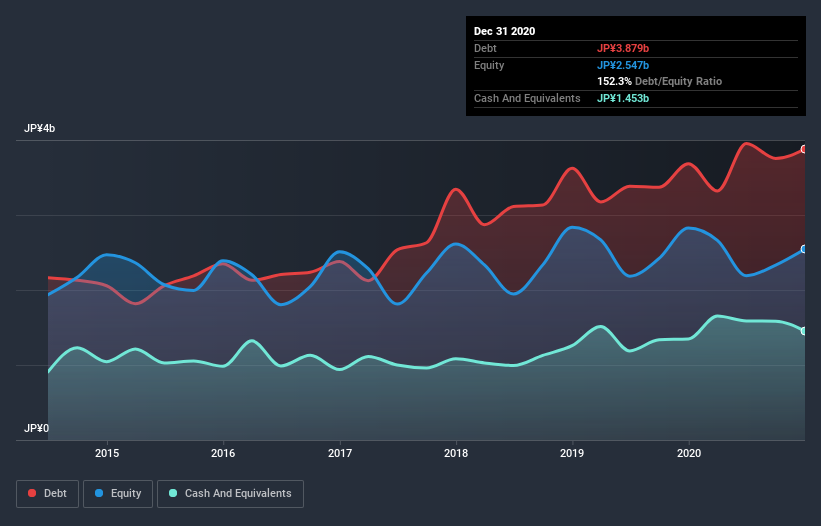The external fund manager backed by Berkshire Hathaway's Charlie Munger, Li Lu, makes no bones about it when he says 'The biggest investment risk is not the volatility of prices, but whether you will suffer a permanent loss of capital.' So it might be obvious that you need to consider debt, when you think about how risky any given stock is, because too much debt can sink a company. We can see that Seigakusya Co., Ltd. (TYO:2179) does use debt in its business. But the more important question is: how much risk is that debt creating?
When Is Debt Dangerous?
Debt assists a business until the business has trouble paying it off, either with new capital or with free cash flow. In the worst case scenario, a company can go bankrupt if it cannot pay its creditors. However, a more usual (but still expensive) situation is where a company must dilute shareholders at a cheap share price simply to get debt under control. Of course, plenty of companies use debt to fund growth, without any negative consequences. The first step when considering a company's debt levels is to consider its cash and debt together.
View our latest analysis for Seigakusya
What Is Seigakusya's Net Debt?
The chart below, which you can click on for greater detail, shows that Seigakusya had JP¥3.82b in debt in December 2020; about the same as the year before. However, it does have JP¥1.45b in cash offsetting this, leading to net debt of about JP¥2.36b.

How Healthy Is Seigakusya's Balance Sheet?
The latest balance sheet data shows that Seigakusya had liabilities of JP¥4.28b due within a year, and liabilities of JP¥2.64b falling due after that. On the other hand, it had cash of JP¥1.45b and JP¥1.99b worth of receivables due within a year. So its liabilities total JP¥3.47b more than the combination of its cash and short-term receivables.
This deficit is considerable relative to its market capitalization of JP¥4.65b, so it does suggest shareholders should keep an eye on Seigakusya's use of debt. This suggests shareholders would be heavily diluted if the company needed to shore up its balance sheet in a hurry. There's no doubt that we learn most about debt from the balance sheet. But you can't view debt in total isolation; since Seigakusya will need earnings to service that debt. So if you're keen to discover more about its earnings, it might be worth checking out this graph of its long term earnings trend.
Over 12 months, Seigakusya made a loss at the EBIT level, and saw its revenue drop to JP¥11b, which is a fall of 6.5%. We would much prefer see growth.
Caveat Emptor
Importantly, Seigakusya had an earnings before interest and tax (EBIT) loss over the last year. To be specific the EBIT loss came in at JP¥173m. When we look at that and recall the liabilities on its balance sheet, relative to cash, it seems unwise to us for the company to have any debt. Quite frankly we think the balance sheet is far from match-fit, although it could be improved with time. Another cause for caution is that is bled JP¥47m in negative free cash flow over the last twelve months. So suffice it to say we do consider the stock to be risky. The balance sheet is clearly the area to focus on when you are analysing debt. But ultimately, every company can contain risks that exist outside of the balance sheet. Be aware that Seigakusya is showing 3 warning signs in our investment analysis , and 2 of those are a bit concerning...
When all is said and done, sometimes its easier to focus on companies that don't even need debt. Readers can access a list of growth stocks with zero net debt 100% free, right now.
When trading Seigakusya or any other investment, use the platform considered by many to be the Professional's Gateway to the Worlds Market, Interactive Brokers. You get the lowest-cost* trading on stocks, options, futures, forex, bonds and funds worldwide from a single integrated account. Promoted
New: Manage All Your Stock Portfolios in One Place
We've created the ultimate portfolio companion for stock investors, and it's free.
• Connect an unlimited number of Portfolios and see your total in one currency
• Be alerted to new Warning Signs or Risks via email or mobile
• Track the Fair Value of your stocks
This article by Simply Wall St is general in nature. It does not constitute a recommendation to buy or sell any stock, and does not take account of your objectives, or your financial situation. We aim to bring you long-term focused analysis driven by fundamental data. Note that our analysis may not factor in the latest price-sensitive company announcements or qualitative material. Simply Wall St has no position in any stocks mentioned.
*Interactive Brokers Rated Lowest Cost Broker by StockBrokers.com Annual Online Review 2020
Have feedback on this article? Concerned about the content? Get in touch with us directly. Alternatively, email editorial-team (at) simplywallst.com.
About TSE:2179
Excellent balance sheet, good value and pays a dividend.
Market Insights
Community Narratives



